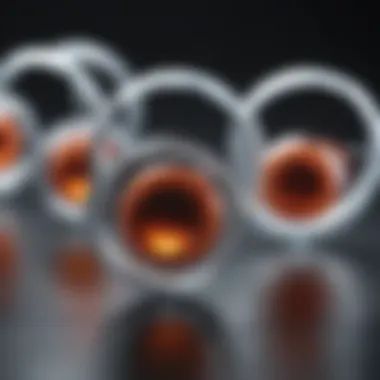Exploring Sigma Anti-Flag M2 Antibodies in Research


Intro
The advent of monoclonal antibodies has transformed the fields of research and biotechnology. Among them, sigma anti-Flag M2 antibodies hold a unique status. They serve not only as a tool for scientific exploration but also bridge various disciplines. Understanding their applications requires examining both their practical uses and the implications they carry in the context of ethical considerations and advancements in science.
Research Overview
Sigma anti-Flag M2 antibodies are integral to protein detection and purification. They target the Flag peptide tag, making them crucial in various molecular and cell biology experiments. Their specificity decreases background noise in assays, leading to clearer data outcomes.
Methodological Approaches
Research involving sigma anti-Flag M2 antibodies typically follows distinct methodologies, including:
- Western Blotting: This technique measures protein levels by using specific antibodies to detect tagged proteins after gel electrophoresis.
- Immunofluorescence: Here, the antibodies are conjugated with fluorescent dyes, enabling the visualization of protein localization within cells.
- Affinity Purification: Researchers use sigma anti-Flag M2 antibodies to isolate proteins from cell lysates effectively, enabling further functional studies.
These varied methods reflect their versatility across different experimental setups. It shows the adaptability of sigma anti-Flag M2 antibodies in enhancing experimental clarity.
Significance and Implications
The significance of sigma anti-Flag M2 antibodies cannot be overstated. Their usage facilitates:
- Enhanced Research Quality: Clear detection of target proteins contributes to reliable experimental findings.
- Interdisciplinary Applications: From basic research to therapeutic development, these antibodies impact several fields, including pharmacology and genetic engineering.
However, with such power comes responsibility. Ethical considerations must be addressed, especially regarding animal welfare and the sourcing of antibodies. Balancing innovation with ethical responsibilities continues to be a challenge within scientific communities.
Current Trends in Science
The landscape of antibody use is evolving. New techniques continue to emerge, making sigma anti-Flag M2 antibodies more relevant.
Innovative Techniques and Tools
Recent advancements include:
- CRISPR Technology: Researchers utilize antibodies alongside CRISPR systems to enhance target specificity and efficiency.
- Nanobody Development: Scientists are exploring alternatives to traditional antibodies, with nanobodies offering high stability and lower immunogenicity.
These innovative techniques align with the growing demand for precision and accuracy in research, maximizing the utility of sigma anti-Flag M2 antibodies.
Interdisciplinary Connections
Today’s research environment favors collaboration across disciplines. Sigma anti-Flag M2 antibodies exemplify this trend as they find applications in:
- Biotechnology: Critical for developing therapeutic proteins.
- Biomedical Engineering: Used in diagnostics, enhancing patient care through clearer identification of biomarkers.
Such connections foster broader knowledge sharing and accelerate discoveries, pushing boundaries that were once considered fixed.
"The significance of these antibodies extends beyond basic research; they are pivotal in many advanced applications across various fields."
In summary, understanding sigma anti-Flag M2 antibodies encompasses recognizing their methodological roles, ethical implications, and interdisciplinary relevance. Their ongoing evolution will continue shaping the future of scientific exploration.
Prelims to Antibodies
Antibodies play a crucial role in the field of biological research and medical applications. As essential proteins produced by the immune system, they are designed to identify and neutralize pathogens like bacteria and viruses. In addition to their natural functions, antibodies are harnessed in laboratories for various applications, including diagnostic tests and therapeutic interventions. Understanding the fundamentals of antibodies is essential for appreciating their diverse uses, especially in the context of Sigma Anti-Flag M2 antibodies that will be explored in greater detail later in this article.


Definition and Function
The term "antibody" refers to a specific glycoprotein that is generated by B cells in response to foreign substances, known as antigens. Each antibody has a unique structure that allows it to bind specifically to a particular antigen. This binding initiates immune responses, facilitating the clearance of the antigen from the body. Beyond their biological role, antibodies are utilized extensively in research and biotechnology, thanks to their ability to recognize specific target molecules, making them invaluable tools for scientists.
Types of Antibodies
A comprehensive understanding of antibodies requires familiarity with two primary categories: monoclonal and polyclonal antibodies. Both types have unique characteristics and applications in research.
Monoclonal antibodies
Monoclonal antibodies are engineered to be identical copies of a single type of antibody, produced by a clone of B cells. This characteristic ensures high specificity and uniformity. To generate monoclonal antibodies, researchers fuse B cells with myeloma cells, creating hybridomas that can produce large quantities of the desired antibody.
The key feature of monoclonal antibodies is their specificity. This means they can bind to one unique epitope of an antigen, allowing for precise targeting in various applications such as immunoassays and therapeutic treatments, including cancer therapy. Their consistency makes them a popular choice among researchers, though their production can be costly and time-consuming.
Polyclonal antibodies
In contrast, polyclonal antibodies are a mixture of antibodies that recognize multiple epitopes on a single antigen. They are produced by different B cell clones and are isolated from the serum of immunized animals. This results in a more diverse response to the antigen than with monoclonal antibodies.
One of the notable benefits of polyclonal antibodies is their robustness. They can provide broader reactivity, which can be advantageous in applications where multiple epitopes need to be recognized, such as in certain diagnostic tests. However, this diversity can also lead to variability and less specificity compared to monoclonal antibodies, making them less desirable for some applications.
In summary, the relationship between antibody types and their applications is complex and significant. A clear understanding enables researchers to select the appropriate type of antibody for their specific needs.
Overview of Sigma Anti-Flag M2 Antibodies
Understanding Sigma Anti-Flag M2 antibodies is crucial for various fields in biological research and biotechnology. These antibodies serve as tools for detecting and purifying proteins, which is fundamental when studying the biochemical processes in cells. Their development has significant implications for advancing our knowledge in protein interactions, genetic engineering, and molecular biology.
What are Sigma Anti-Flag M2 Antibodies?
Sigma Anti-Flag M2 antibodies are specific immunoglobulins that detect the FLAG tag, a peptide sequence often used in recombinant protein research. This antibody binds to the FLAG tag with high specificity, which means that any protein tagged with it can be isolated and analyzed. The FLAG tag typically comprises a small stretch of amino acids, enabling researchers to track tagged proteins through various stages of experimentation.
By utilizing these antibodies, scientists can examine protein expression patterns, assess localization within cells, and purify proteins for further study. This specificity is key; the ability to differentiate between proteins with similar characteristics is a significant advantage in research settings. Moreover, the use of Sigma Anti-Flag M2 antibodies allows for reproducibility in experiments, which is an essential aspect of scientific validation.
Specificity and Affinity
The specificity and affinity of Sigma Anti-Flag M2 antibodies highlight their role in effective protein analysis. Specificity refers to the antibody's ability to bind only to its target, minimizing cross-reactivity with other proteins. This characteristic is vital to ensure that the results obtained are accurate and meaningful.
The affinity of these antibodies indicates the strength of the interaction between the antibody and the FLAG tag. A high-affinity antibody will bind even in low concentrations of the target protein, making it useful for detecting proteins present in small amounts.
Researchers benefit from knowing these parameters:
- High specificity ensures accurate identification of proteins labeled with the FLAG tag.
- Strong affinity improves the sensitivity of detection methods, allowing for reliable results even in complex biological samples.
"The combination of high specificity and affinity makes Sigma Anti-Flag M2 antibodies a valuable asset in the toolkit of modern biological research."
In summary, Sigma Anti-Flag M2 antibodies play a critical role in enhancing research accuracy through their distinct binding properties. Understanding these elements is crucial for anyone involved in scientific research regarding proteins.
Applications in Scientific Research
The significance of Sigma Anti-Flag M2 antibodies extends far into various domains of scientific inquiry and biotechnology. Understanding their applications is crucial for anyone involved in research, particularly in fields like molecular biology, biochemistry, and genetic engineering. These antibodies are tailored for specific binding interactions with protein targets fused to the Flag epitope, thus facilitating numerous beneficial processes.
Protein Detection and Purification


One of the primary applications of Sigma Anti-Flag M2 antibodies is in the detection and purification of proteins. These antibodies can be used in various techniques such as enzyme-linked immunosorbent assays (ELISA), Western blotting, and immunoprecipitation. In these processes, is important to accurately isolate proteins of interest from complex mixtures, which is critical for downstream applications.
Utilizing these antibodies in purification workflows offers several advantages. For example, the strong binding affinity they exhibit towards the Flag epitope allows researchers to achieve high-purity protein samples. This is particularly useful when working with transfected or transformed cell lines where numerous proteins may be present.
In most laboratories, using Sigma Anti-Flag M2 for isolation leads to better yield and fewer contaminations of target proteins, which are essential for the subsequent analysis and application.
Studying Protein-Protein Interactions
Another key area where Sigma Anti-Flag M2 antibodies make a significant impact is in the study of protein-protein interactions. Understanding how proteins interact with one another is fundamental for deciphering cellular processes and signaling pathways. By tagging proteins of interest with the Flag epitope, researchers can employ Sigma Anti-Flag M2 antibodies for co-immunoprecipitation assays.
These assays enable scientists to capture complex protein associations and examine these interactions under various cellular conditions. Furthermore, this technique can help identify potential interaction partners, thus broadening the understanding of cellular functions and mechanisms. The ability to study protein-protein interactions helps to illuminate the broader implications of molecular mechanisms in health and disease.
Transgenic Research
Transgenic research frequently requires robust tools to confirm the presence and function of transgenes. Sigma Anti-Flag M2 antibodies serve a pivotal role in this context. When researchers generate transgenic organisms—often for the purpose of studying gene function or producing specific proteins—the ability to analyze the expression of the Flag-tagged proteins is crucial.
Employing these antibodies enables scientists to monitor the expression levels and validate the success of transgenic constructs. This ensures that the resultant organisms adequately express the desired genes, which is vital for any analysis of gene function or therapeutic applications.
Moreover, using these antibodies simplifies the tracking of Flag-tagged proteins throughout various tissues or developmental stages in transgenic organisms. Consequently, Sigma Anti-Flag M2 antibodies are indispensable in transgenic research as they enhance the understanding of gene expression patterns and protein functions in living systems.
Manufacturing of Sigma Anti-Flag M2 Antibodies
The manufacturing process of Sigma Anti-Flag M2 antibodies is a crucial aspect that ensures their quality and performance in various research applications. The synthesis of these antibodies involves several intricate steps that require precision and stringent adherence to protocols. Understanding this process not only highlights the technological advancements in biotechnology but also emphasizes the importance of quality in producing reliable scientific tools.
Production Processes
The production process of Sigma Anti-Flag M2 antibodies typically initiates with the generation of the specific antigen. This antigen is a peptide sequence that corresponds to the Flag tag recognized by the antibodies. Following the synthesis of the antigen, it undergoes purification to remove any contaminants that might interfere with the antibody's specificity.
Once purified, the antigen is then used to immunize suitable host animals, commonly mice or rabbits. These animals produce immune responses against the antigen, leading to the generation of antibodies. After a specified immunization period, the animals' serum is collected and screened for the presence of antibodies specific to the Flag tag.
The selected sera undergo further purification through various chromatographic techniques, which can include affinity chromatography. This ensures that the final product consists predominantly of the desired anti-Flag M2 antibodies. The overall goal is to achieve antibodies with high specificity and affinity, suitable for application in diverse scientific research areas.
Quality Control Measures
Quality control is paramount in the manufacturing of Sigma Anti-Flag M2 antibodies. Ensuring that these antibodies meet rigorous standards is essential for their functionality in experimental settings. Various quality control measures are implemented throughout the manufacturing process.
- Testing for Specificity: One of the first steps in quality control involves confirming that the antibodies specifically bind to the Flag tag and do not exhibit cross-reactivity with other proteins.
- Purity Assessment: Techniques such as SDS-PAGE are employed to ascertain the purity of the antibody preparations. The presence of unwanted bands indicates contamination and necessitates further purification.
- Functional Validation: The effectiveness of the antibodies is tested through functional assays, which validate their performance in applications such as Western blotting or immunoprecipitation.
Moreover, compliance with guidelines from organizations like the FDA or EMA is crucial. Such adherence ensures that the antibodies produced are suitable for use in research and potentially in therapeutic applications. The comprehensive quality control measures not only enhance the reliability of Sigma Anti-Flag M2 antibodies but also affirm their value as essential tools in modern scientific exploration.
"Manufacturing high-quality antibodies is not just about production; it encompasses a deeper commitment to transparency, reproducibility, and scientific integrity."
Through careful consideration of these processes and measures, researchers can trust in the efficacy of Sigma Anti-Flag M2 antibodies in their studies.
Ethical Considerations in Antibody Research
Ethics plays a crucial role in the field of antibody research, particularly when considering the implications of developing and applying tools like Sigma Anti-Flag M2 antibodies. The advancement of biotechnologies often walks a fine line between necessary scientific exploration and ethical considerations. Researchers must navigate a landscape that mandates responsibility and accountability.
Antibodies, including the Sigma Anti-Flag M2, are foundational elements for many laboratory techniques in biological research. Their usage in experiments often invokes questions about the sourcing, handling, and testing, as well as their influence on human health and the environment. Therefore, discussing ethical considerations is not merely academic; it is essential for fostering trust in scientific practices and promoting public support for research.
Guidelines and Regulations


To ensure ethical integrity in antibody research, a series of guidelines and regulations have been established worldwide. These protocols aim to guide researchers in conducting their work responsibly, including attention to the following:
- Sourcing of Materials: Researchers must source antibodies and other materials ethically, ensuring that no harm comes to the animals or humans involved in production.
- Proper Lab Practices: Laboratories are expected to follow strict hygiene and safety regulations to prevent cross-contamination and ensure the validity of results.
- Transparency in Reporting: It is critical for researchers to share their methodologies and results comprehensively, allowing for reproducibility and independent verification.
- Compliance with Local Laws: Each country has specific regulations regarding research using biological materials. Adhering to these local laws is a fundamental aspect of ethical conduct.
Adhering to these guidelines is vital not only for the respect of local and international laws but also for maintaining the integrity of scientific research as a whole.
Impact on Human Health and Environment
The application of antibodies, notably Sigma Anti-Flag M2 antibodies, has far-reaching consequences on human health and the environment. As these antibodies are utilized in diagnostics and therapeutic interventions, their development must consider several factors:
- Potential Health Risks: There is a constant concern over the risk of adverse reactions to antibodies. Understanding these implications can guide safer practices and enhance patient care.
- Biomedical Innovations: While the benefits can be profound, researchers must also consider the potential for misuse or unintended consequences of antibody applications in biomedicine.
- Environmental Considerations: The production and disposal of antibodies can impact the environment. Sustainable practices in antibody research are key to minimizing any negative footprint.
"Ethical research is not just about upholding integrity; it is about ensuring that scientific advancement is in harmony with human welfare and ecological sustainability."
Challenges and Limitations
The exploration of Sigma Anti-Flag M2 antibodies involves various challenges and limitations that can significantly affect research outcomes. Understanding these constraints is essential for researchers and practitioners in the field. Addressing issues such as reproducibility and cross-reactivity ensures that the findings derived from experiments are reliable and applicable in diverse contexts. Acknowledging these limitations also helps in framing future studies and technological advancements more effectively.
Reproducibility Issues
Reproducibility is a cornerstone of scientific research, allowing for validation of results through repeat experimentation. In the context of Sigma Anti-Flag M2 antibodies, reproducibility issues can arise due to several factors, including variations in experimental conditions and the biological variability of samples. For instance, different batches of antibodies may exhibit slight differences in their reactivity or specificity, which can lead to inconsistent results across labs.
Researchers have noted that the protocols used for assays can also play a crucial role in the reproducibility of results. If these protocols are not standardized, it can lead to discrepancies in data interpretation. Additionally, the genetic background of the model organisms used in experiments can result in varying levels of antigen expression, further complicating reproducibility.
To mitigate these challenges, it is essential to:
- Employ standardized protocols when using Sigma Anti-Flag M2 antibodies.
- Maintain a detailed record of experimental conditions and variations.
- Engage in collaborative efforts between laboratories to validate findings.
Cross-Reactivity Concerns
Cross-reactivity is another significant limitation concerning Sigma Anti-Flag M2 antibodies. This phenomenon occurs when an antibody recognizes and binds to antigens other than its intended target. Such reactions can result in misleading data and erroneous conclusions. In some cases, cross-reactivity may stem from structural similarities between the target protein and other proteins present in the sample. This can be especially prominent in complex biological matrices, where multiple proteins are present.
Understanding the specificity of Sigma Anti-Flag M2 antibodies is crucial for minimizing cross-reactivity. It is imperative for researchers to be aware of potential cross-reactions, particularly when interpreting results from techniques like Western blotting or immunofluorescence.
To address these concerns, scientists can:
- Conduct control experiments to identify non-specific binding.
- Utilize blocking agents to reduce background noise in assays.
- Validate results with alternative methods to ensure consistency across experiments.
In summary, continuous examination of reproducibility and cross-reactivity issues is vital in ensuring the reliable use of Sigma Anti-Flag M2 antibodies in research.
Future Perspectives and Innovations
The landscape of antibody research is continuously transforming. In particular, the advancements in Sigma Anti-Flag M2 antibodies serve as a testament to this evolution. Understanding future perspectives and innovations is essential because it shapes how researchers will leverage these tools in scientific exploration. The discussion on innovations often highlights emerging trends, potential applications, and the ethical implications associated with these advancements. This section will delve into both the technological advancements and the new realms of applications that are on the horizon.
Emerging Technologies in Antibody Development
The field of antibody development is on the cusp of significant breakthroughs. Various emerging technologies are redefining how antibodies like Sigma Anti-Flag M2 are produced and utilized. One prominent area is the application of synthetic biology. This field focuses on engineering organisms for the customized production of antibodies. Traditional methods may become less common as synthetic biology enables the design of tailored antibodies with specific properties.
Phage display is another notable innovation. This technique allows the identification of high-affinity binders within vast libraries of antibodies, leading to the discovery of antibodies that are highly specific and effective. Additionally, platforms utilizing CRISPR technology help in optimizing antibody genes, thus improving yield and reducing production time.
Moreover, advancements in nanotechnology are enabling the conjugation of antibodies to nanoparticles, enhancing their delivery and targeting capabilities. These developments promise enhanced efficacy in diagnostic and therapeutic applications.
Potential New Applications
As technologies advance, so too do the potential applications for Sigma Anti-Flag M2 antibodies. Antibodies are increasingly utilized across various research fields, including oncology, immunology, and neurobiology. With the integration of emerging technologies, their scope of application is expanding further.
- Targeted Drug Delivery: With refined capabilities in binding specificity, there is potential for using Sigma Anti-Flag M2 antibodies in personalized medicine. This could lead to targeted therapies that focus on specific cancer cells, minimizing treatment side effects.
- Diagnostics: Enhanced sensitivity in detecting biomarkers can vastly improve diagnostic procedures. This can revolutionize how diseases are diagnosed, enabling earlier intervention and potentially improving patient outcomes.
- Therapeutic Research: Innovations can fuel the development of novel therapies, such as monoclonal antibodies for chronic diseases, including autoimmune disorders.
- Multiplexing Applications: New technologies will likely allow the use of multiple antibodies simultaneously in various assays, enhancing the analysis of complex biological systems.
As these applications materialize, researchers must also consider the ethical implications that come with using advanced technologies and methodologies. The careful navigation of these issues will be essential to ensuring responsible progress in antibody research.



